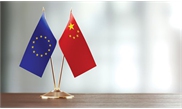IN-DEPTH / DIPLOMATIC CHANNEL
Landmark agreement signed to protect 100 geographical indications

Chinese market is a high-growth potential market for European products. Photo: IC
China and the European Union (EU) concluded the negotiations on a bilateral agreement on Wednesday to protect 100 of EU's Geographical Indications (GI) in China and 100 Chinese GI in the EU against imitations and usurpation. This landmark agreement is expected to result in reciprocal trade benefits and demand for high-quality products on both sides.The agreement is a concrete example of cooperation between the EU and the People's Republic of China, delivering on the commitment made at the last April's EU-China Summit and reflecting on the openness and adherence of both sides to international rules as a basis for trade.
"European geographical indication products are renowned across the world for their quality. Consumers are willing to pay a higher price, trusting the origin and authenticity of these products, while further rewarding farmers. This agreement shows our commitment to working closely with our global trading partners such as China. It strengthens our trading relationship, benefits our agricultural and food sectors, and consumers on both sides," said Phil Hogan, EU's commissioner of agricultural and rural development.
China is the second destination for EU agricultural exports. It is also the second destination of EU export products protected as Geographical Indications, accounting for 9 percent of its value, including food, wines, and spirit drinks.
The Chinese market is a high-growth potential market for European food and drinks, with a growing middle-class with a taste for iconic, high-quality and genuine European products. It also has a well-established geographical indication system of its own, with specialties that European consumers could now further discover thanks to this agreement.
The EU list of GI to be protected in China include such products as Cava, Champagne, Feta, Irish whiskey, Münchener Bier, Ouzo, Polska Wódka, Porto, Prosciutto di Parma and Queso Manchego. Among the Chinese products, the list includes Pixian Dou Ban (Pixian Bean Paste), Anji Bai Cha (Anji White Tea), Panjin Da Mi (Panjin rice) and Anqiu Da Jiang (Anqiu Ginger).
Following the conclusion of the negotiations, the agreement will now face legal scrutiny. On the EU side, the European Parliament and the Council will be asked to approve the agreement, which is expected to enter into force by the end of 2020.
The scope of the agreement will expand to an additional 175 GI names from both sides by 2024. EU-China cooperation on GI began over 10 years ago in 2006, resulting in the registration and protection of 10 GI names on both sides in 2012, the starting block for today's agreement.

